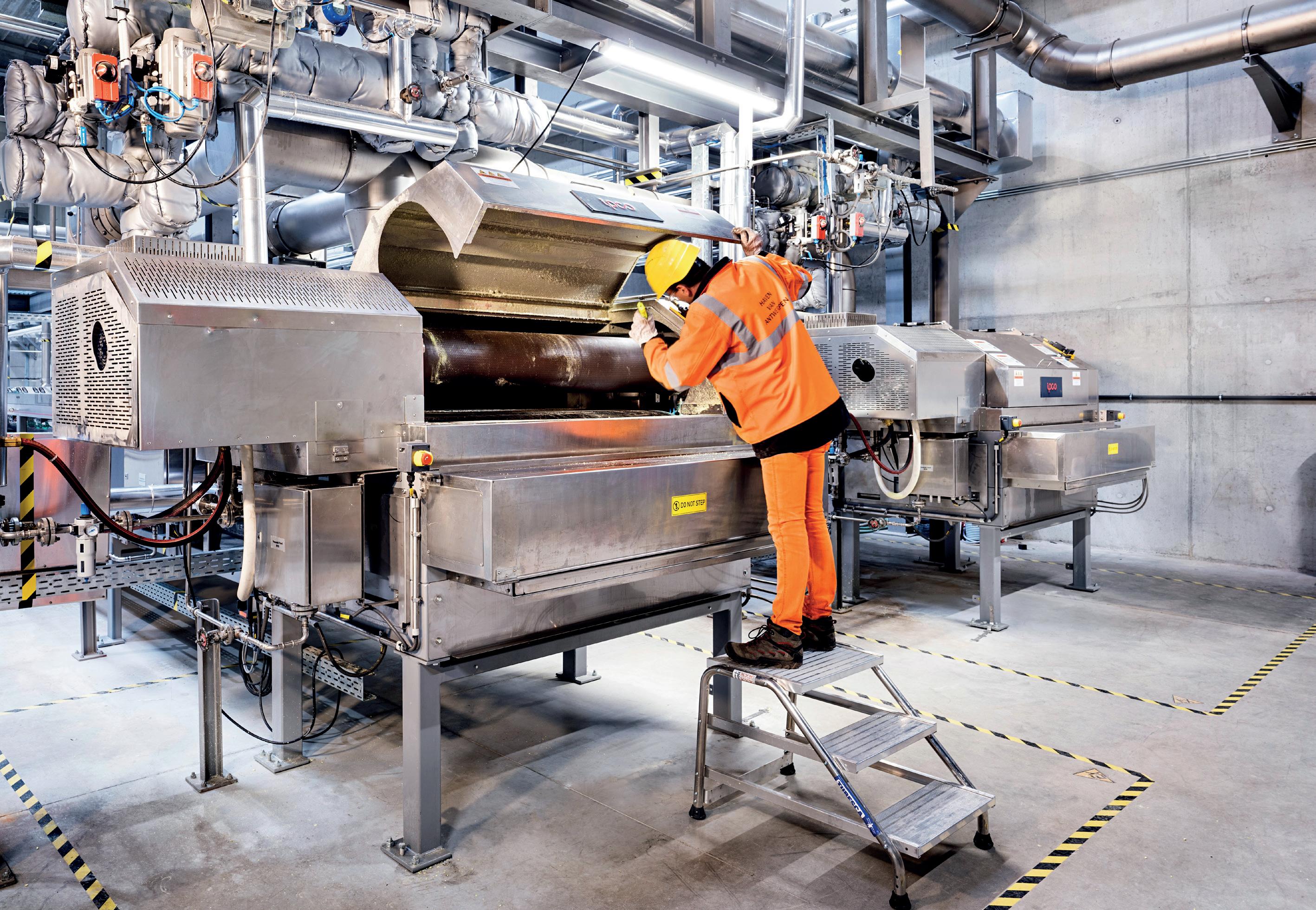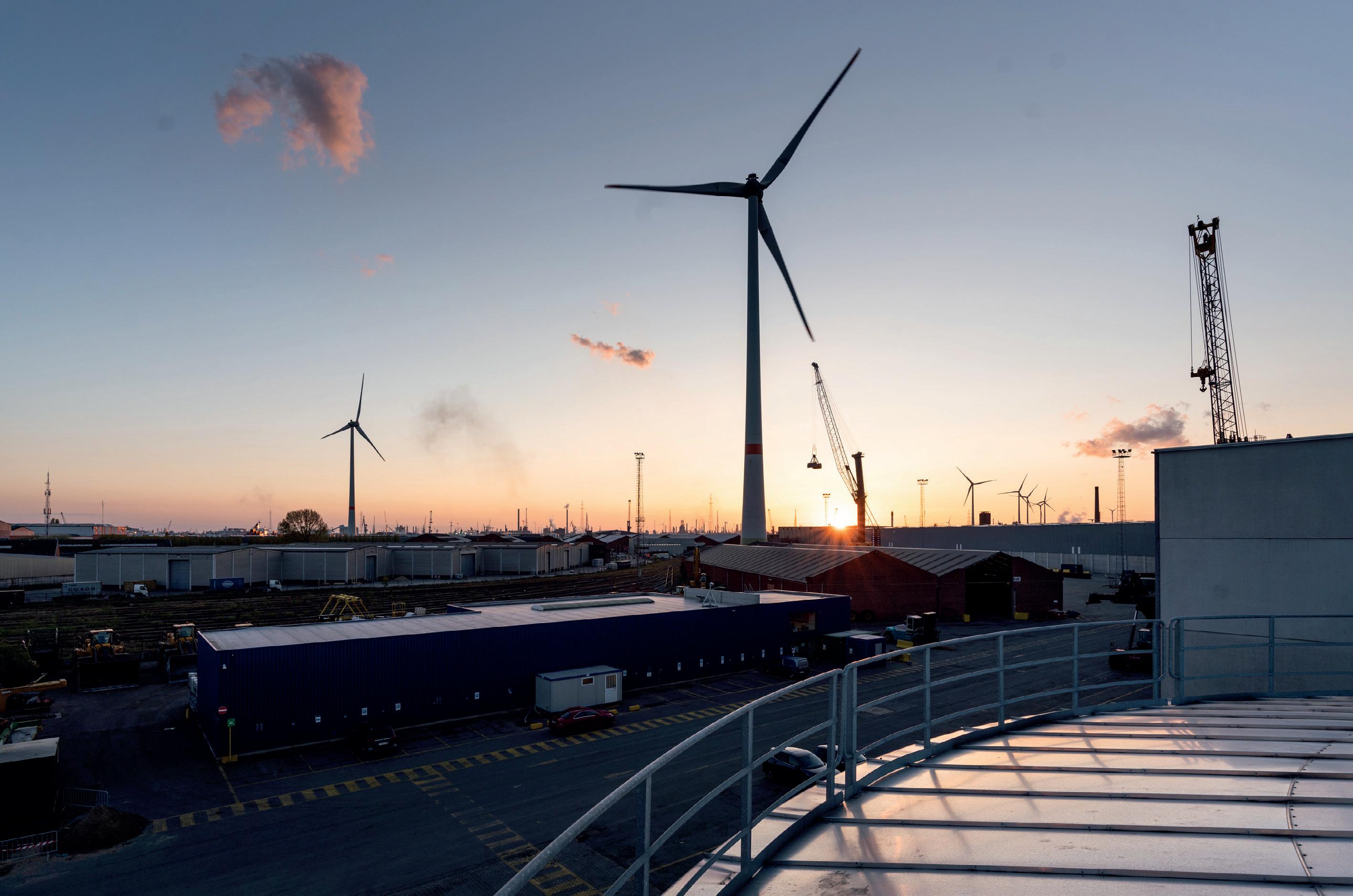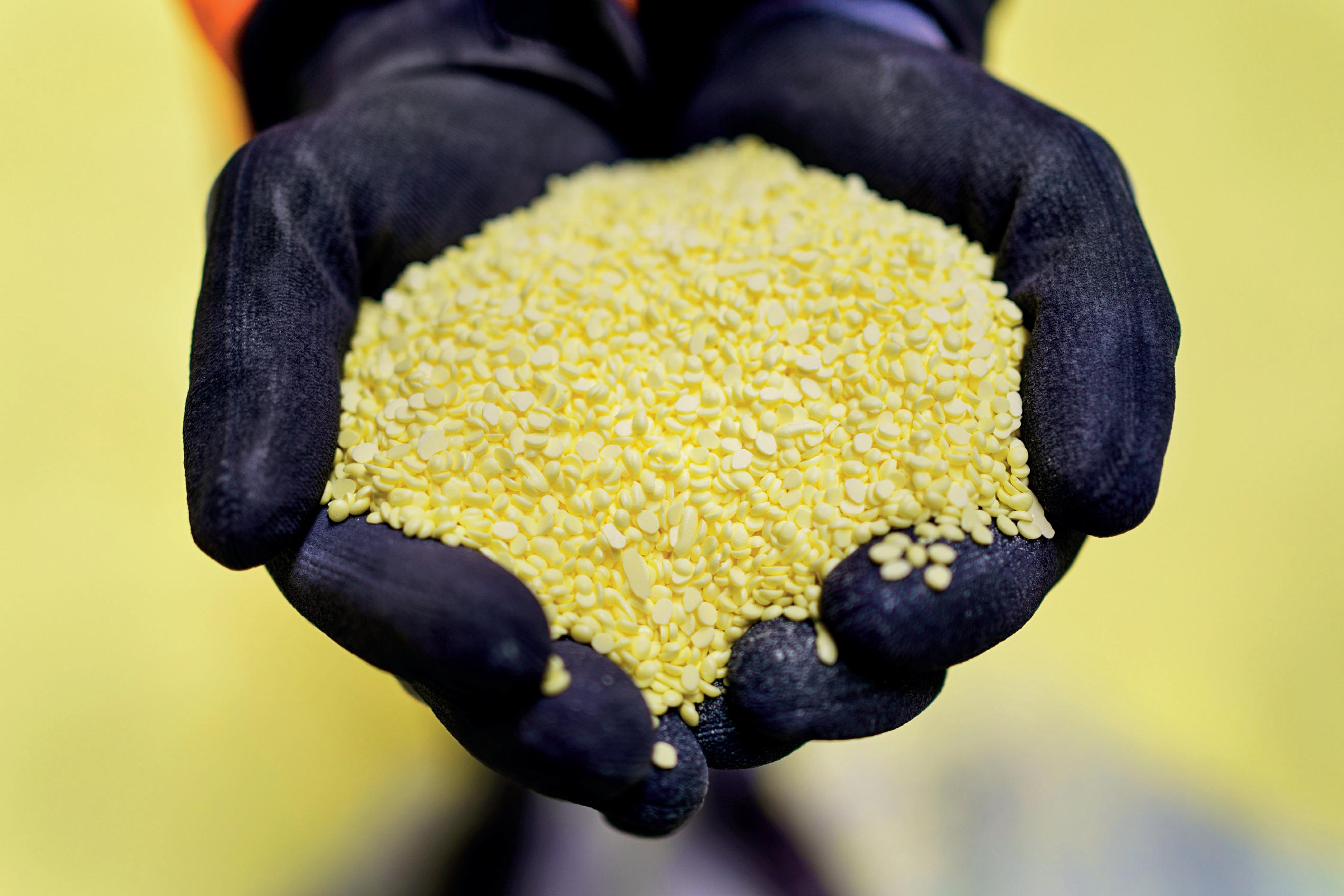
7 minute read
Process matters
Ulrich Nanz, IPCO, Germany, discusses the opening of Duval’s sulfur processing terminal at the Port of Antwerp, Belgium.
Asulfur solidification terminal now operating in the Port of Antwerp, Belgium, is the latest example of a growing trend in the sulfur industry: downstream, post-refinery processing is being outsourced to specialist logistics companies.
Operated by Duval, a subsidiary of German chemical marketing and logistics services company solvadis, the facility receives liquid sulfur from a number of refineries in
Western Europe, and uses IPCO’s high-speed Rotoform HS technology to handle the solidification process.
Sulfur has different applications in various industries worldwide, including use in fertilizer products and in the production of sulfuric acid. Since transportation of hot liquid sulfur over long distances by ship is rather limited, the liquid sulfur extracted during the refining process needs to be converted into solid form for ease of storage, handling and transportation.

Figure 1. IPCO high-capacity Rotoform HS sulfur granulation units.

Figure 2. IPCO Rotoform feed station.

Figure 3. Duval’s sulfur processing terminal in the Port of Antwerp.
Sulfur logistic services
Headquartered in Frankfurt, Germany, solvadis is one of the world’s leading international service providers in terms of processing, handling and distributing commodity and specialty chemicals, and it has more than 100 years of experience in the sulfur industry.
Subsidiary company, Duval NV, was already home to a major liquid sulfur terminal in the Port of Antwerp, so this was the obvious choice when deciding the location for its new sulfur-forming facility.
This investment means that Duval is now able to receive liquid sulfur by rail, road, waterway (barges and seagoing vessels) and pipeline, and can convert it into high-quality formed solid sulfur for onward shipping and distribution by trucks, containers, barges and seagoing vessels.
Together with existing liquid sulfur storage tanks, the new sulfur-forming facility is the largest sulfur storage and processing hub in Northwest Europe.
IPCO’s Rotoform pastillation technology was selected for this particular installation. It delivers a defined granule shape and size with minimal moisture content. The location of the facility meant that environmental and safety factors were a key consideration, so low emissions during processing and handling were also important.
The site required a technology that would be able to cope with throughput rates that can vary across different shift operations. Selecting multiple lines that can be shut down and restarted at short notice provided the flexibility required.
Duval also required a partner with the engineering capacity to handle the project in a short time, and the after-sales support capability to provide a rapid response in the event of any issues arising during regular operation.
The sulfur solidification process
The solidification facility is based around multiple IPCO Rotoform HS lines in parallel, each with the capacity to process several tons of pastillated sulfur per hour.
IPCO’s scope of supply also included the connection to a large jacketed sulfur tank where liquid sulfur can be received by truck or ship, and a ProCool system to pre-condition the liquid sulfur temperature in the supply line. IPCO was also responsible for specifying a rubber belt conveyor for the collection of granules from the discharge end of the granulation machines, and the design of interconnecting piping for liquid sulfur; and utilities such as cooling water, steam for heating, and compressed air. The whole system is controlled from a central programmable logic controller (PLC) system that allows remote access for fast analysis and support from abroad.
Rotoform HS delivers high-quality solidified sulfur in a form that meets the Sulphur Development Institute of Canada’s (SUDIC) premium specifications, i.e. narrow size distribution of granules, low dust content, minimum moisture and a high bulk density. In addition to requiring a system that has high availability and predictable operation and maintenance costs, health, safety and environment (HSE) was also an important consideration for Duval, and Rotoform has proven credentials in this respect.
Pre-conditioning
The liquid sulfur is received in the storage tank at a temperature that is too high to yield satisfactory results from the pastillation procedure. As such, IPCO’s solution includes its ProCool sulfur pre-conditioning technology – an air-cooled finned tube system that lowers the temperature of the liquid sulfur to the required level. The waste heat can also be used to heat the production area during the cold season.
The sulfur is first fed through a filter by means of pumps, then conveyed through the pre-conditioning unit. The patented system reduces the temperature of the product to the optimal level of 125 – 128°C, in preparation for the granulation/pastillation process. At this temperature, product viscosity is between 10 – 15 mPas, which ensures that product quality and throughput rates are optimised, excessive dust formation is avoided, and the solidified sulfur meets the SUDIC specification.
This is a reliable, low-maintenance solution. Other benefits of the technology include a simple modular design, fully-automated operation, low utility consumption, and emission-free performance.
Granulation
IPCO’s high-capacity Rotoform HS sulfur granulation units consist of a heated, cylindrical stator, and a large perforated rotating shell that turns concentrically around the stator, depositing sulfur drops across a continuously-running steel belt cooler.
A system of baffles and internal nozzles built into the stator provides uniform pressure across the whole belt width, resulting in an even flow through all holes of the perforated rotary shell. This ensures that all pastilles are of uniform size, from one edge of the belt to the other.
As the steel belt travels along the system, cold water is sprayed against the underside of the belt and heat is transferred, indirectly, from the sulfur melt to the cooling water, resulting in quick, controlled solidification. The fact that there is no contact between the molten sulfur and the cooling water means that there is no risk of cross-contamination.
A discharge temperature of less than 70°C ensures smooth downstream handling of the solid product. To eliminate the possibility of damage to the pastilles during discharge, a silicon-based release agent is applied to the steel belt as a thin film.
At the end of the belt coolers, the solid sulfur is deposited onto a collecting conveyor and transported via the handling system towards the bulk storage area. The efficiency of this single-step, liquid-to-solid process results in a quality classified as ‘premium’, as defined by the SUDIC specifications in 1977 (see Table 1).
The process also offers a number of environmental advantages. As the cooling water and sulfur never come into contact, there is no need for a water treatment system at the solidification stage; the water can simply be re-cooled and used again.
Solidification takes place rapidly – usually in less than 10 sec. – so there is little time for hydrogen sulfide to escape, resulting in very low emission values in compliance with European regulations, and there is no need for additional equipment such as scrubbers or burners. Similarly, low dust levels mean that exhaust air treatment with wet scrubbers or cyclones is not required. Additionally, with extremely low energy consumption requirements, the Rotoform process is also an economical and environmentally-friendly sulfur solidification solution.
Table 1. SUDIC specifications
Mean size 2 – 4 mm
Size distribution < 5%, > 4.75 mm min. 75%, 4.4 – 2.4 m < 2%, < 1.19 mm < 0.1%, < 0.3 mm Moisture < 0.5% by weight Friability < 1% fines (< 0.3 mm) under stress level I < 2% fines (< 0.3 mm) under stress level II Bulk density 1150 kg/m3 loose, 1320 kg/m3 agitated Angle of repose Not < 25˚ Compaction < 0.2% fines by weight under static load < 0.5% fines by weight under dynamic load

Figure 4. SUDIC premium-quality sulfur pastilles.
Flexible solution capable of handling different throughput rates
A key benefit of installing multiple Rotoform HS units alongside one another is that individual lines can be shut down – and restarted – in minutes, enabling the capacity of the facility as a whole to be adjusted to changing throughput rates. This delivers a level of flexibility that would be impossible to achieve with a single high-capacity system. This multi-system approach also enables lines to be closed down for cleaning or routine maintenance without halting overall production.
This ability to handle variable throughput rates was proved during the commissioning process. Various start-up and shutdown scenarios with different loads per unit were tested to simulate different production rates, and the overall system was shown to offer the high levels of flexibility required.










